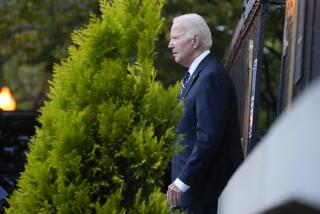Reagan Sees No Bad Motives in Iran Affair
- Share via
SANTA BARBARA — President Reagan said in an interview released Monday that he believes no key White House figures in the Iran- contra scandal acted out of “bad motives” and implied that Congress’ investigation of the affair was politically inspired.
Reagan also repeated his conviction that his sale of U.S. arms to Iran was directed at Iranian moderates, saying that the sales were kept secret in part to protect them from retaliation by supporters of the Ayatollah Ruhollah Khomeini.
In the interview, given last Wednesday to Time magazine, the President showed little of the remorse over the scandal that he expressed in a nationally televised speech later that same evening.
Reagan said in that speech that he had been “stubborn in pursuit of a policy that went astray” and that he was wrong to ignore warnings that disclosure of the secret arms sales would be politically disastrous.
In the Time interview, Reagan defended the Iran arms sales as “a response by us to an appeal from this other group of individuals who wanted to discuss better relations with our country.”
“Contrary to what some of the people have said, I was not doing business with the (sic) Khomeini,” he said. “ . . . These were people that were anticipating another government to follow him.”
Reagan appeared to bear little ill will toward former national security advisers Rear Adm. John M. Poindexter and Robert C. McFarlane or toward Marine Lt. Col. Oliver L. North, the central figures in the affair.
“I can understand why they did what they did and what their motives were and certainly they weren’t bad motives,” he said. “And I’m just sorry it turned out that way.”
He appeared less forgiving, however, of the Democratic-controlled Congress, which this month completed three months of nationally broadcast hearings into the scandal.
He noted that Democratic-led Congresses previously had staged inquiries into actions by Republican Presidents Dwight D. Eisenhower, Richard M. Nixon and Gerald R. Ford, and added: “I don’t recall any investigations of presidents when the presidents and the legislature were of the same party.”
When asked whether he believes 1988 presidential politics motivated the congressional inquiries, Reagan said: “Well, I’m not going to comment on that. . . . Maybe I shouldn’t have said what I said.”
Reagan said he hopes history will remember the inquiry as “the big investigation that finally discovered the President was telling the truth from the very beginning.”
On other matters, Reagan said that he expects to rejoin the “mashed-potato circuit” after leaving the White House, speaking out for policies and people he favors.
The President also said that elective politics has been far and away the most enjoyable of his many jobs, outranking radio broadcasting, acting and the seven summers he spent as a lifeguard in which he claimed to have rescued 77 swimmers.
Reagan said he “fought like a tiger” against running for his first office, governor of California, until a group of wealthy GOP friends convinced him that only he could unite the state’s warring Republicans.
But a few months after assuming the office, he said, he and his wife, Nancy, “looked at each other, sitting in the living room in Sacramento, and said, ‘this makes everything else we’ve ever done look as dull as dishwater.’ ”
More to Read
Sign up for Essential California
The most important California stories and recommendations in your inbox every morning.
You may occasionally receive promotional content from the Los Angeles Times.













